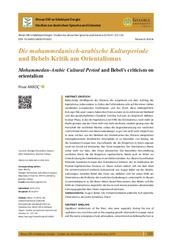Die mohammedanisch-arabische kulturperiode und Bebels kritik am orientalismus
| dc.contributor.author | Akkoç, Pınar | |
| dc.date.accessioned | 2020-08-28T12:03:38Z | |
| dc.date.available | 2020-08-28T12:03:38Z | |
| dc.date.issued | 2019-06-21 | |
| dc.identifier.issn | 1303-9407 | en_US |
| dc.identifier.uri | http://hdl.handle.net/10679/6857 | |
| dc.identifier.uri | https://sdsl.istanbul.edu.tr/tr/yazi/10-26650-sdsl2019-0002-7900430031003600590070006C004D0043004A0038003100 | |
| dc.description.abstract | Significant intellectuals of the West, who were especially during the rise of capitalism very much focused on the ongoing growth of powerful European states and the newly emerging cultural atmosphere, concentrated on defining the East as unchanging and the societies of the Eastern world as despotic and tyrannical. During the transition period from capitalism to colonialism the Europeans were seeking more and more power, the East was certainly not a rival any more and it was legitimate to regard the East as inferior whereas the predominance of Western norms was agreed upon. During such a period, in which this idea of the surrogate Europe was accepted by the majority of Western actors, it is interesting to have a look at the European socialists and their way of perceiving the East as the orientalist perception did not only function as a way of depreciating the East but also as a way of creating an atmosphere which resulted in the Western bourgeois social norms rule over European countries. Granting a privilege to these norms was a tool to oppress the working class. Because of this reason it was important for the socialists in Germany to try to overcome orientalism. This present study deals with the Mohamedan Arabic cultural period by the German socialist August Bebel with the intention to point out how Bebel tries to give a new definition to the East and to defeat the orientalist point of view. The aim is to show that Bebel's criticism on orientalism is still valid and can play a guiding role in connection to the everlasting derogatory attitude towards the East. | en_US |
| dc.language.iso | deu | en_US |
| dc.publisher | İstanbul Üniversitesi | en_US |
| dc.relation.ispartof | Studien zur deutschen Sprache und Literatur | |
| dc.rights | openAccess | |
| dc.title | Die mohammedanisch-arabische kulturperiode und Bebels kritik am orientalismus | en_US |
| dc.title.alternative | Mohammedan-Arabic cultural period and Bebel’s criticism on orientalism | |
| dc.type | Article | en_US |
| dc.description.version | Publisher version | en_US |
| dc.peerreviewed | yes | en_US |
| dc.publicationstatus | Published | en_US |
| dc.contributor.department | Özyeğin University | |
| dc.contributor.authorID | (ORCID 0000-0002-3978-1874 & YÖK ID 23829) Akkoç, Pınar | |
| dc.contributor.ozuauthor | Akkoç, Pınar | |
| dc.identifier.volume | 1 | en_US |
| dc.identifier.issue | 41 | en_US |
| dc.identifier.startpage | 123 | en_US |
| dc.identifier.endpage | 134 | en_US |
| dc.identifier.wos | WOS:000472603000007 | |
| dc.subject.keywords | August Bebel | en_US |
| dc.subject.keywords | Mohamedan-Arabic cultural period | en_US |
| dc.subject.keywords | Orientalism | en_US |
| dc.subject.keywords | German socialists | en_US |
| dc.subject.keywords | Orient | en_US |
| dc.subject.keywords | Die mohammedanisch-arabische Kulturperiode | |
| dc.subject.keywords | Orientalismus | |
| dc.subject.keywords | Deutsche Sozialisten | |
| dc.contributor.authorFemale | 1 | |
| dc.relation.publicationcategory | Article - International Refereed Journal - Institution Academic Staff |
Files in this item
This item appears in the following Collection(s)
Share this page



